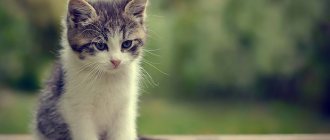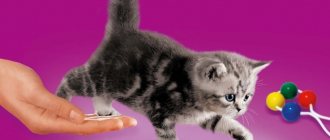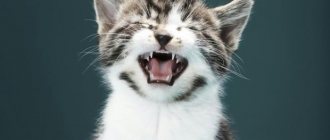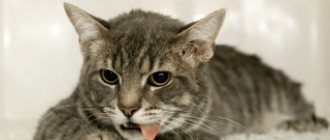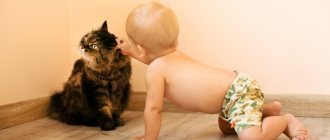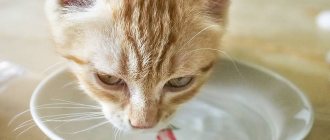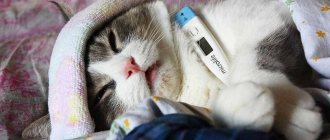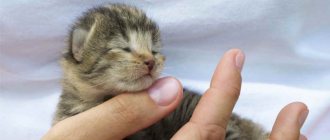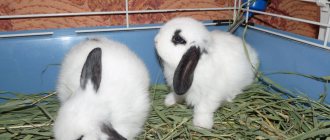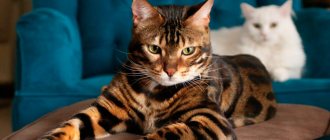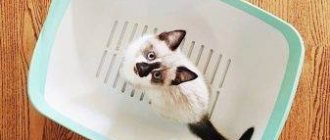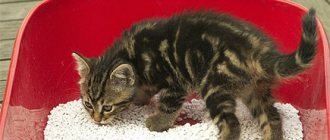Prevention
To prevent your pet from refusing to eat, the following simple measures should be followed:
- normalize diet;
- do not allow the cat to be outside uncontrolled;
- diversify your diet;
- feed the animal only premium and super-premium mixtures;
- exclude food from the human table;
- choose food in accordance with the cat’s taste preferences;
- avoid stressing the animal;
- sterilize your pet in time or provide him with a full sex life;
- carefully transfer to a new diet, especially kittens;
- prevent the animal from overheating in the hot season;
- vaccinate annually;
- regularly deworm and treat for external parasites;
- Long-haired breeds should be combed out and given pastes to prevent the formation of hairballs;
- Bring your pet to the veterinarian regularly for checkups.
When loss of appetite is not a symptom of any disease.
Stress and depression.
READ When can you start walking your puppy?
Cats are very sensitive animals. As a result of a sudden change in the usual lifestyle, the cat may refuse the food offered to it. Experts refer to changes in habitual lifestyle:
- Moving to a new place of residence.
- A long journey of many hours when traveling to another area.
- The appearance of a new animal (dog, etc.) in the apartment.
- Birth of a child.
- Dangerous situations (a fight with a cat, another cat, the threat of an attack on a cat by a dog, etc.).
- A conflict situation in the family, lack of proper attention from the owner.
Weather change.
- Hot weather may cause your cat to lose its appetite. This is common for cats that live in apartments all year round. With the onset of warm weather, they become less active and consume less food in hot summer weather; as soon as the temperature drops outside, their appetite returns to normal.
- Strong changes in atmospheric pressure and sudden changes in weather can cause loss of appetite.
- In the spring, when cats are “walking”, and also when they sense a cat in the neighborhood who is in heat, the cats have no time to eat, so they suddenly lose body weight. Some cats begin to lose their appetite a week before the onset of heat, and when it comes, they completely refuse to eat, and spend their time only sleeping and persistently calling for their partners.
Why does a cat eat poorly and lose weight?
The moderately well-fed cat suddenly began to eat poorly and lose weight.
The first and main reason for a cat’s refusal to eat and sudden weight loss is the presence of a source of inflammation or another disease. Therefore, such a condition can be regarded as a symptom that requires special attention. The reasons for an animal’s refusal to eat food or water are divided into psychological and medical.
Psychological factor
Many diseases in a cat can appear after stress. In this case, they say that the cat was latently infected.
If the basis is a psychological factor, then appetite is completely absent. This may happen for the following reasons:
- moving to another place;
- change of owner;
- the appearance of a new person in the environment;
- change of diet.
Medical factors
The body may experience inflammatory processes, disturbances in the functioning of internal organs, and blood diseases. Painful and unpleasant sensations also affect lack of appetite and refusal to eat. Such reasons are cause for concern and immediate contact with a veterinarian.
Increased salivation may be a sign of an incipient disease.
It is important to understand that there is a difference between medical and psychological causes. So, in case of ill health, the following symptoms are added to the lack of appetite:
- salivation;
- lethargy;
- slow reactions;
- lack of mobility and desire to play;
- difficulty or heavy breathing;
- discharge of pus;
- nausea and vomiting;
- change in habitual behavior.
Gastrointestinal problems and other diseases
Cat's gastrointestinal tract.
Such symptoms may indicate problems with the gastrointestinal tract - indigestion, poisoning, an allergic reaction to a feed component, pancreatitis, problems with internal organs.
In addition, diseases such as:
- kidney disease (including urolithiasis);
- vision problems;
- damage and injury;
- diseases of the nasopharynx;
- presence of parasites.
Disease
If your cat has lost its appetite, the reason may lie in some disease. Problems with eating food may arise due to the following pathologies:
- diabetes;
- pancreatitis;
- infectious diseases;
- helminthic infestations;
- leukemia;
- problems with teeth or oral cavity (stomatitis, gingivitis, etc.);
- renal failure;
- food poisoning;
- intestinal diseases.
If your pet is sick, he will usually have other symptoms:
- vomit;
- nausea;
- lethargy and low activity;
- change in color of mucous membranes;
- rapid breathing, etc.
If your cat has no appetite, is lethargic, or you notice any changes in behavior, contact your veterinarian immediately. He will order an examination, and after establishing a diagnosis, he will prescribe treatment and select the right diet. Do not self-medicate, since it is impossible to determine pathology by lack of appetite.
Important! In some cases, refusal to eat is caused by prolonged use of medications, as the animal becomes intoxicated. In this case, you need to remove toxins from the body and adjust the basic treatment.
The cause of the pathology is most often the penetration of foreign objects into the gastrointestinal tract. These can be small toys, threads, pins, Christmas tree rain and other objects that the cat plays with. Intestinal obstruction can also be caused by hair. This pathology poses a danger to the pet's life. If the intestine is completely blocked, surgery may be required. Other symptoms usually indicate a problem:
- bloating;
- lethargy and inactivity;
- lack of stool;
- abdominal pain;
- increasing vomiting.
READ Why cats shouldn't look in the mirror
Some owners give the animal Vaseline oil so that the stuck object comes out on its own, but this is strictly prohibited. When moving, it injures the intestines. An examination and consultation with a doctor is required.
Little kitty
On average, kittens are weaned from their mother at about 1 month of age. Little kittens, weaned from their mother early, simply do not know how to eat or drink anything other than mother's milk from the mammary gland of the mother cat. They receive all nutrients and liquid from it. They only have a developed sucking reflex, so they will have to be fed from a nipple. To feed such babies, it is recommended to purchase a special formula for kittens, since cow or goat milk is too fatty for them.
Owners are also often worried - the kitten does not drink water, what to do? A milk-fed baby has virtually no need for water. Cats start drinking water later when they switch to solid food.
What to do when the kitten begins to eat poorly?!
The kitten eats poorly and sleeps a lot,
or, conversely, restless. The temperature can be elevated (over 39.5 C) or lower (lower limit 37 C). Waiting for everything to return to normal on its own is dangerous. A little more than a day without food for a kitten under the age of six months is fraught with consequences that are difficult to correct. Due to weakness and dehydration, the baby’s body will not be able to cope with the disease on its own.
The kitten eats little, what to do
? He should be seen immediately by a veterinarian.
The doctor will provide the necessary assistance, examine the baby, and prescribe recommendations for treatment. In an emergency, the kitten must be hospitalized.
The kitten is stressed
New kitten owners often struggle with giving up dry food. They bring the baby into the house, having thoroughly prepared and provided the new family member with everything necessary, including high-quality dry food. As a rule, their first desire is to feed the pet, and the disappointment and even anxiety of the owners is quite understandable when it encounters the kitten’s complete indifference to food.
No need to rush! Let the baby get used to the new place, explore the territory, get used to the fact that he was left without his mother, brothers and sisters. Before offering him food, it is better to play with the baby, this will calm him down and allow him to work up an appetite.
Natural causes
Sometimes even pets that have no health problems refuse to eat. Poor appetite in a cat can be caused by:
- Stress. When moving, visiting an exhibition, having guests or other stress, the animal refuses to eat. An attentive attitude towards the pet, affectionate communication, and feeding with treats usually helps to solve the problem.
- Dirty dishes. Cats are very clean, so they may refuse food due to a poorly washed bowl or the presence of a sour smell. Using a detergent with a strong scent will also repel the animal.
- Heat. In the summer heat, pets limit their food intake. There is no point in insisting otherwise, but ensuring constant access to clean water is extremely important.
- Approaching birth. A couple of weeks before the birth of the offspring, females reduce the amount of food they eat. Fasting should not be allowed. You should choose special food with vitamin complexes.
- Hormonal changes. At puberty, animals refuse food. This applies to both males and females. Such fasting usually does not harm the pet.
- Change of food. If you switch from dry food to natural food or you change from one manufacturer to another, your pet may show character and refuse to eat. To prevent this problem, new food should be introduced gradually.
- Change of feeding place. Pets get used to one place, and therefore moving the bowl often causes protest. If your cat has a poor appetite due to a change in feeding location, and you don’t know what to do, try returning the bowl to its original location.
Older pets have a reduced need for food due to less activity. A weak appetite in this case is normal and therefore does not require human intervention.
Reason four: loads
Of course, you had to watch the children. At home and on the street, they are able to run, jump, gallop, and tumble for hours. A child by nature is a bundle of energy that requires an outlet. As this energy is consumed, the need to replenish it arises, that is, appetite appears. It is extremely rare (I don’t even remember) that children who regularly engage in sports complain of lack of appetite.
In our clinic, a fairly large group of girl swimmers and girl gymnasts was examined. We conducted a preventive examination of Nakhimovites and cadets. No one had a bad appetite. And the point is not that they are poorly fed. They all just have a high level of physical activity.
High energy consumption - and the child has no problems with appetite.
It is possible that in the above example the phenomenon of “collective nutrition” is also important. Even in the old days, wealthy people with weak-willed offspring used to invite children from poor families to dinner. It turns out that a good appetite is contagious. And in our time, when a child eats in a group and when he knows that what he does not eat will be eaten with pleasure by his comrades, this has a very stimulating effect on his appetite.
But the relatives of the overweight boy complain about his lack of appetite. It turns out that he is exempt from physical education on some far-fetched pretext, after school he takes additional classes in a foreign language, plays the violin at a music school, and uses the computer in the evening. An ordinary modern child! What is there to be surprised about? Yes, even with a decreased appetite, he remains overweight.
How can we help here? We will have to break the entire established structure of family life. It is not enough to give your offspring useful advice. A personal example is needed here. You will have to go for a run with him in the morning, play football with him in the afternoon, ski in the winter, ride a bike in the summer, take him to the pool, go hiking. Or - admit your parental failure and leave everything as it is.
What diseases can cause
The following diseases can provoke loss of appetite and refusal of water in cats:
- malignant tumors - can be asymptomatic for a long time, most often affecting old animals, which at the same time begin to rapidly lose weight and prefer a sedentary lifestyle;
- renal failure - can occur in a pet at any age, while the cat rarely goes to the toilet, urine is excreted in small quantities;
- helminthic infestations are a common cause of loss of appetite in an animal at any age; in addition, symptoms such as stool disorders, weight loss, hair loss, vomiting, etc. are often present;
- fungal diseases - accompanied by deterioration of appetite, refusal of water, hair loss, skin rashes, itching and a general unsatisfactory condition in which the cat refrains from active games;
- intestinal obstruction - can be the result of stuck hairballs, helminthic infestation, while the pet does not go to the toilet and tries to hide.
Fungal diseases in cats can cause loss of appetite
A friend’s cat suddenly lost his appetite and drank very little. At first she thought it had something to do with the extreme heat. Then the cat began to hide and lost a lot of weight. When I came to visit her and called my pet, he came out of hiding. He was terribly thin and could barely sit. Suddenly I discovered a sore on his withers and a lack of hair in this place. She advised me to immediately contact a veterinarian, as I suspected the presence of a tick. I recommend carefully examining your pets if their appetite worsens and they refuse water. Provoking factors are not always as harmless as they may seem at first glance. Now the cat has almost fully recovered, but long-term therapy is still required.
When you can't put off visiting a doctor
If within three days the cat’s appetite is not restored and it refuses to drink, then it is necessary to urgently consult a doctor, as the risk of dehydration is high.
It is also important to visit a specialist if your animal has the following symptoms:
- vomit;
- hair loss;
- rash;
- loose stools;
- elevated temperature;
- weakness.
What to do if the kitten does not go to the litter box?
If you see that the baby has not used his litter tray for its intended purpose, you should not punish him, much less beat him. A small kitten that finds itself in a new place may simply become confused or scared, and therefore make a mistake. A loud scream also frightens the animal, but it does not understand why you are swearing. It is better to strictly explain to your pet why you are unhappy, and then thoroughly wash the area that your pet has soiled using a cleaning product. You can also spray this area with a special spray that has a strong odor that is unpleasant for cats. The kitten should be taken to its litter box and explained in a soft, calm voice that it is better to go to the toilet here.
You can attract a kitten to your litter box by changing the litter - today there is a huge selection of both manufacturers and types of cat litter. Therefore, if your furry (or not so furry) baby refuses to go to his toilet, try changing the litter. And to determine which litter your pet likes best, you can pour different types of litter into two different trays: where the kitten will go to the toilet more often, that litter should be left for him.
There are also several different types of litter boxes for cats. Try to experiment with them and choose exactly the type that suits your kitten. For example, trays with walls and a roof (the so-called closed ones) are perfect for very modest and shy kittens, as well as those who bury their feces very intensively - this will save you from scattering litter throughout the apartment.
Also make sure that the existing tray does not have too high sides - it is inconvenient for the kitten to climb into it due to its small size. As the baby grows, the tray will probably need to be replaced with a more comfortable toilet that has higher sides.
And also make sure that the cat litter box is always clean, because cats are very squeamish animals, and they are unlikely to want to go into a dirty litter box.
If, despite all efforts, the kitten continues to stubbornly go to the toilet past its litter tray, or has constipation or diarrhea, be sure to take it to the veterinarian - timely monitoring of its condition will save you and your baby from many possible problems.
The owner of the kitten notices that the baby is not eating well. For adult animals, lack of appetite is not as fatal as for a baby. Why doesn't the kitten eat?
? What are the consequences of malnutrition for a small animal?
First you need to determine the reason for refusing to eat.
. At best, this is a well-fed, spoiled kitten who goes on strike from overeating and an abundance of “delicious foods,” when the owners offer the baby all the best and continuously.
Reasons why a domestic kitten does not eat anything
A similar option is simply overfeeding
. The owner does not know how to correctly calculate the portion depending on the age, size, weight of the kitten, and constantly gives the baby an excess amount. The kitten is simply not able to physically absorb such a portion; it is always more than full, and begins to ignore food.
But the picture becomes less rosy if the kitten refuses to eat.
due to illness. Almost any illness leads to a lack of appetite. The situation is even sadder if the kitten, in addition to refusing to eat, stops drinking.
For babies, as for adult cats, the following diseases are typical:
- gastrointestinal problems (intestinal colic, ulcers, dysfunction, etc.);
- diseases of internal organs (liver pathologies, kidney failure, etc.);
- diseases of the oral cavity (problems with gums, teething, diseased teeth, etc.);
- helminthic infestation in a kitten;
- poisoning;
- foreign body in the stomach, esophagus;
- stress;
- infectious disease, etc.
The most common causes of early kitten mortality.
Reasons related to childbirth and mother.
Hypoxia
(lack of oxygen), injuries, hypothermia. Kittens born after a difficult birth (dystocia) are much more likely to die as infants. This occurs as a result of possible birth injuries and (or) hypoxia. Research shows that cats with extreme features, such as the flat face of the Persian, are more likely to have difficulty giving birth, likely due to a combination of features such as the kitten's relatively large size, large head, and the cat's narrow pelvis. Due to the lack of oxygen during birth, kittens may be born dead or too weak to suckle enough milk afterwards.
First birth
at the cat. Kittens from the first litter have a higher mortality rate on average, likely due to the cat's inexperience, injury, and possible cannibalism. Cats that have given birth multiple times (more than five times) may also experience difficulty during labor.
Obesity
cats. Mortality among kittens whose mother is overweight also increases.
Others
Reasons: lack of milk, mastitis, abandonment of kittens.
Congenital anomalies in kittens.
Congenital anomalies are physical defects that are present from birth. These can be both genetic abnormalities and disorders during intrauterine development (for example, due to the use of medications, past illnesses, etc.), leading to the formation of defects in the fetus. The most common birth defects are:
- Cleft palate;
- Umbilical hernia;
- Skeletal defects;
Kittens with significant defects are usually stillborn or die in the first days of life. Moderate disorders lead to the decline of kittens or may appear at an older age. Since inbreeding also increases the risk of inherited diseases, hereditary disorders are more common in purebred cats.
The kitten is underweight.
Low weight kittens are more at risk of hypothermia, dehydration, respiratory problems and infectious diseases, which significantly increases the risk of early death. Kittens may be born underweight due to maternal malnutrition, disease, birth defects, or other causes that result in poor blood supply to the placenta.
The average weight of a newborn kitten for domestic cats and most pedigree cats ranges from 90 to 100 grams, although some breeds have a normal kitten weight that is less (for example, Oriental cats) and some more (Maine Coons). If a kitten weighs less than 75g, the likelihood of death is quite real.
Poor conditions for the development of a kitten.
The environment significantly influences kitten mortality:
Air temperature
. Room temperature is very important for the proper development of kittens. If kittens are cold, they very quickly get tired of sucking milk, which leads to hypothermia and hypoglycemia. To maintain temperature (especially for orphaned kittens), it may be necessary to warm their box to a temperature of 29-32°C, and the kittens should be able to freely move away from the heater to a cooler area. By 7-10 days the temperature can be gradually reduced to 27°C, and by the end of the first month of life - to 22-25°C.
Poor hygiene
. Increases the risk of infectious diseases.
A large number of kittens
. Increases the risk of infectious diseases and malnutrition as a result of competition for food (milk).
Excessive cat care
. Constant licking of kittens can limit their time for feeding, and in nervous cats even lead to cases of cannibalism. Since newborn kittens cannot shiver, which prevents them from maintaining body temperature, they may become hypothermic, which in turn leads to a further decrease in activity and milk output.
Improper cat nutrition.
It is very important that the food meets the needs of a nursing cat, since the quality of milk depends on it, which greatly affects the health of kittens. It is advisable to feed your cat high-quality food designed specifically for nursing cats.
A lack of milk produced by a cat can have the following reasons:
Insufficient milk intake in a kitten can occur as a result of:
- Deterioration in health or weakness;
- Competition with other kittens;
- Poor living conditions;
Signs of low milk supply for kittens.
For control, kittens should be weighed immediately after birth, weighed daily during the first week and twice a week starting in the second week of life. Normal indicators must meet the following parameters:
- In the first day, the kitten can lose no more than 10% of its weight;
- From the second day the kitten should gain 10-15g/day (5-10%);
- The kitten's weight should double in 1-2 weeks;
Any weight loss (or lack of weight gain) should be cause for concern.
If a cat does not produce enough milk, the kittens need additional nutrition.
Neonatal isoerythrolysis.
For some cat breeds, neonatal isoerythrolysis is a fairly common cause of death in kittens. The cause of death in this case is the incompatibility of the blood groups of the cat and the kitten.
Infectious diseases (viral, bacterial, parasitic).
The kitten should begin suckling within the first 2 hours of life. Kittens receive antibodies from the cat's milk by absorbing them during the first 16 to 24 hours of life, so it is important that they nurse well during this period. Milk is necessary not only for good nutrition, but also for the acquisition of maternal derived immunity, which protects them from infections.
The effectiveness of maternal immunity usually decreases at 3-4 weeks of life, individually for each kitten; by this time the amount of antibodies should be sufficient. A kitten's own immunity has not yet developed, and since most vaccination programs begin after 8 weeks, kittens are at increased risk of infectious diseases during this period. Kittens that suckle poorly will not receive enough colostrum and will therefore not be protected by maternal immunity, becoming especially susceptible to infectious diseases at an early age.
Among the factors that increase the risk of infectious diseases in a kitten are the following:
- Insufficient amount of colostrum;
- Malnutrition;
- Low birth weight;
- Lack of oxygen during childbirth;
- Congenital diseases (especially of the immune system);
- Stress
- A large number of kittens in the litter;
- Poor sanitary living conditions;
- Low ambient temperature;
Respiratory and intestinal infections affect kittens especially often.
Among the infectious agents of diseases leading to the death of kittens, the most dangerous are:
In kittens, bacterial infections are often secondary to viral infections (cat flu, leukemia, immunodeficiency, peritonitis, parvovirus), although they can also be primary. Clinical signs depend on the nature and severity of the infestation and may include diarrhea, cough, difficulty breathing, arthritis, dermatitis, as well as less obvious signs more typical of fading kittens. Ultimately, many of these infections lead to septicemia (a form of sepsis where there are large numbers of bacteria in the blood) and death.
Intestinal parasites (including roundworms and coccidia) can become a problem if the cat is not treated for parasites or has poor hygiene. Severe parasite infestations can worsen the general condition of kittens, causing loose or bloody stools, loss of appetite, bloating, weight loss, and sometimes death.
Food quality as a cause of decreased appetite in cats
Sometimes it happens that a cat’s appetite worsens due to a change in the quality of food. The cat feels well, does not show symptoms of the disease or they have been excluded by the veterinarian, but the appetite is still reduced; the pet eats, but as if reluctantly, perhaps even asks for other food
In this case, you need to pay attention to the food your cat eats.
First, check the expiration dates on the packaging and make sure that the food is not expired. Also analyze the storage conditions - if they are violated, the food may lose its taste and even deteriorate. It must be stored in a cool place, without access to light and air, in a tightly closed container so that it does not erode.
Re-read the ingredients on the food package and try to determine if it has changed. You can use the manufacturer’s websites or online pet stores to compare the information on them with the composition on the packaging. It happens that the manufacturer changes the formula of the food, adds new ingredients to the composition or excludes something from it, reduces or increases the amount of any ingredient - cats can react to such innovations, including with a decreased appetite.
It is also important to check the organoleptic properties of the food (smell, taste, color, shape of granules). If they are not the same as the product in the previous pack or are very different, contact the store where you made the purchase, the manufacturer or distributor and try to negotiate an exchange of food or a refund
If your cat does not eat dry food well, you can try giving it soaked: pour a small amount of food into a bowl, add a little water to it, let it sit for a while (10-15 minutes) and offer it to the cat. Not all cats agree to eat dry food in this modified form, but there are some who like it. When feeding soaked dry food, the main thing is to follow safety rules: pour in as much food as the cat will eat at a time, and do not leave it in the bowl for a long time - in hot weather, bacteria will begin to multiply in it within half an hour, and such food will become dangerous to the cat's health.
If a cat does not eat wet food well, the algorithm of actions is the same as in the case of dry food: we check expiration dates, storage conditions, organoleptic properties, changes in composition. All these factors need to be analyzed and understood what could be the reason for the deterioration of appetite. Manufacturers usually have many different flavors in their wet food lines; you can offer your cat wet food with a different flavor and watch her appetite. But do not overdo it, so as not to develop pickiness in your pet.
To make wet food more attractive to your cat, you can warm it up to 35-40 degrees (but no more) and see if the cat's reaction to warm food changes.
It is also extremely important not to leave canned food in the bowl for a long time: put in as much as the animal can eat in one meal, so that the food in the bowl does not dry out and so that pathogenic bacteria do not multiply in it
Common causes of increased appetite
A condition in which a pet feels hungry all the time is commonly called “polyphagia.” This concept implies a pathological change in eating behavior. To determine whether your cat needs to visit a veterinarian and receive treatment, you should identify the possible cause of its increased appetite.
Sometimes a pet's gluttony can be explained by its increased activity. Most often this applies to young individuals. Such a case should not worry the owner much, provided that the cat is not emaciated or obese, the condition of the coat and teeth does not deteriorate, and there is no vomiting after eating.
During the cold season, the consumption of calories to warm the body of a pet increases noticeably. This may be one of the reasons why your cat constantly asks for food.
But there are situations when a pet’s appetite increases due to other factors that require human intervention.
Unbalanced diet
The first step is to check whether the animal is getting the required amount of calories and nutrients from the food on which its diet is based. Specialized foods have information on their packaging about the amount consumed by the cat at one time. If your pet does not eat enough for one meal, the food may be of too low quality and does not meet the needs of his body.
Cats that eat natural food may experience a constant feeling of hunger due to vitamin deficiency. To restore balance, you should take a course of vitamin complexes
It is important to follow the recommended regimen for their use. For young animals under 1 year of age, nutritional supplements are especially necessary.
Pregnancy and lactation
Natural reasons for an increase in a cat's appetite include the period of pregnancy and lactation, when the female needs more nutrients to fully feed her young. The average gestation period is 9 weeks. At the initial stage of pregnancy, the amount of food a cat eats often decreases. This is associated with possible toxicosis. But by week 4, appetite increases noticeably.
In this situation, the animal should be transferred to a specialized diet designed specifically for pregnant animals. This food is designed taking into account the needs during pregnancy and contains the necessary complex of vitamins.
The increase in appetite in each cat is individual and can occur at different times.
Much depends on the breed of the animal, its condition and physical activity.
If worms are detected, the veterinarian will prescribe the necessary medications. After the course of treatment, the cat's appetite will return to normal. Experts advise feeding your pets 2 times a day: morning and evening.
Diseases of the gastrointestinal tract
The presence of diseases associated with the digestive system has a strong impact on the absorption of nutrients from food. Among these pathologies:
- neoplasms in the intestine of a malignant nature;
- inflammatory processes in the intestines;
- exocrine insufficiency.
Often, in pathological conditions, an animal experiences weight loss along with increased appetite. In this case, contacting a specialist is mandatory.
Why does the kitten eat a lot or sleep a lot, is this normal? We hasten to reassure you - if the cat is gaining weight well, is inquisitive and playful during the waking period, then there is no reason for concern. During the period of active growth, animals require a lot of energy, which is compensated by food.
This is why babies eat more than adults. Having eaten properly, a healthy kitten, as a rule, goes to the side.
The kitten is naughty
All family members want to pamper the baby, and this desire is quite understandable, but food is not the best, and in any case, not the healthiest way to show your affection. Communication and games are much more important to a kitten, but additional treats can only lead to overeating, although the dry food in the bowl will remain untouched.
Constant chaotic treats also have another danger - the kitten may begin to systematically “extort” tasty treats from each family member in turn, and they, out of the kindness of their hearts, will feed the pet everything that it does not ask for. This situation does not lead to anything good - from digestive disorders to the appearance of excess weight.
Do not follow the kitten’s lead, feed in accordance with the recommended norm, and if the baby is naughty, do not give him anything other than dry food, and warn all family members about this. As a rule, after a few hours of the fast, the appetite returns.
My child does not eat meat (fish, vegetables, fruits, cereals)
Observe your child: you can often figure out why this or that product “didn’t please him” and, if possible, make it more attractive. Here are some tips.
If the child does not like vegetables. “Just” boiled vegetables, as well as “just” porridge, get boring for children quite quickly, but the combination of these two products can cause approval. Even the most picky baby will not find chopped cauliflower in dairy-free oatmeal, and oatmeal with milk will perfectly “hide” potatoes. At first, there should be no more than a teaspoon of vegetables in the “secret” dish, gradually their quantity can be increased to 1/3 of the total volume. It is good to sprinkle this porridge with mild grated cheese and breadcrumbs.
Why doesn't he eat fruit? Typically, fibrous fruits (peaches, pears, plums) are avoided by children who still have a residual infantile gag reflex. It is designed by nature to be protective, helping to prevent suffocation. If chewable fruit fibers reach the root of the tongue, the body uses the gag reflex to push the food back out.
Some children retain remnants of this reflex longer than others. They no longer spit up like babies, but simply try to avoid foods that are difficult to completely crush with their teeth.
The best solution in this case is to return to the already forgotten fruit puree (it can be served with porridge or cottage cheese), gradually increasing the number and size of uncrushed pieces.
Are cottage cheese and yogurt tasteless? You can make something similar to a homemade dessert from fermented milk products. For example, beat yogurt and cottage cheese without additives in a blender until you get a homogeneous mass similar to cream. Mix with smooth fruit puree. You can eat it right away, or you can put it in the refrigerator for a while - you get “ice cream”.
If your baby flatly refuses to eat “sour” yogurt, put it in an ice cream cup, insert a wooden stick and put it in the freezer for 2 hours. You will probably like the “ice cream”, which means that after a while, “just” yogurt will no longer cause protest.
Porridge of my own making. Place a bowl and several saucers with pieces of dried fruit and cookies in front of the baby; fresh fruit or berry sauce; waffle crumbs, etc. The self-invented porridge will certainly be eaten with pleasure.
How to hide meat? The champions of hide and seek are chicken and turkey; this white meat is very easy to hide in vegetable puree or porridge. Many picky eaters willingly eat beef as part of potato casserole. A win-win option is beef and dough. Sometimes, instead of a boring cutlet, offer a sandwich with cold meat and a sprig of dill; pancakes or meat pies.
If he refuses fish. The most common reason for refusal is smell. The most hypoallergenic way to get rid of it is to add a little milk to the fish broth when cooking, and when stewing, add sliced raw potatoes to the pan.
Even those children who once pricked themselves with a bone turn up their noses at fish. In this case, the best compromise would be fish balls, potato casseroles and fish pies.
Reasons why a kitten won't eat
Kittens that are already eating solid food instead of mother's milk are usually 6-8 weeks old. They are the ones who most often refuse to eat. Why is this happening?
Still looking for something he likes
When kittens first start eating solid food, owners should vary their diet by offering foods of varying flavors and firmness. For example, it could be pate, broth, pieces of chicken liver or stew. Thanks to this variety, the kitten will be able to understand which food is easier to eat and what it likes best.
Also important when selecting food is its temperature. Any wet food should be at room temperature or a little higher - then the kitten will most likely like this food.
Presence of upper respiratory tract infection
Upper respiratory tract infections are quite common in kittens. With this disease, they experience nasal congestion and fatigue. These two symptoms make it difficult for your pet to smell delicious food. As a trick, you can put food with a strong aroma in the bowl. You can also change the taste and density of food - in some cases this helps.
If your kitten sneezes a lot, is snotty, or has watery eyes, you should call a veterinarian.
Foreign object eaten
Kittens are quite curious creatures, so a situation may well occur when the baby eats everything that is on the floor. For example, thread, hair tie, New Year's tinsel - all this can fall victim to his curiosity. This may make him feel unwell.
The best way to get rid of such a problem is to prevent its occurrence through timely cleaning. If this happens, you should immediately contact a veterinarian. It will help either through medication or surgery to rid the kitten of the foreign object.
A dog or other cats scare the baby
Although many kittens have quite cheerful personalities and often want to interact with other animals, some babies are scared of other cats or even dogs. This is especially evident when it comes to meals.
To solve this problem, it is enough to create a safe area for the kitten, in which other pets cannot reach it. The baby will feel more confident.
